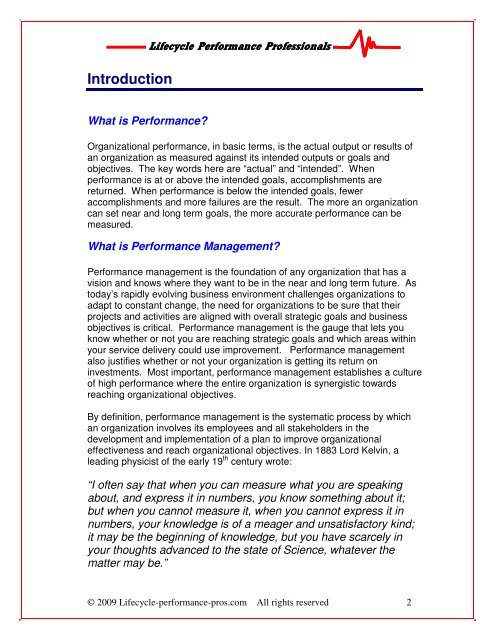Download the Performance Management Fundamentals Guide
Download the Performance Management Fundamentals Guide
Download the Performance Management Fundamentals Guide
Create successful ePaper yourself
Turn your PDF publications into a flip-book with our unique Google optimized e-Paper software.
Introduction<br />
Lifecycle Lifecycle <strong>Performance</strong> <strong>Performance</strong> Professionals<br />
Professionals<br />
What is <strong>Performance</strong>?<br />
Organizational performance, in basic terms, is <strong>the</strong> actual output or results of<br />
an organization as measured against its intended outputs or goals and<br />
objectives. The key words here are “actual” and “intended”. When<br />
performance is at or above <strong>the</strong> intended goals, accomplishments are<br />
returned. When performance is below <strong>the</strong> intended goals, fewer<br />
accomplishments and more failures are <strong>the</strong> result. The more an organization<br />
can set near and long term goals, <strong>the</strong> more accurate performance can be<br />
measured.<br />
What is <strong>Performance</strong> <strong>Management</strong>?<br />
<strong>Performance</strong> management is <strong>the</strong> foundation of any organization that has a<br />
vision and knows where <strong>the</strong>y want to be in <strong>the</strong> near and long term future. As<br />
today’s rapidly evolving business environment challenges organizations to<br />
adapt to constant change, <strong>the</strong> need for organizations to be sure that <strong>the</strong>ir<br />
projects and activities are aligned with overall strategic goals and business<br />
objectives is critical. <strong>Performance</strong> management is <strong>the</strong> gauge that lets you<br />
know whe<strong>the</strong>r or not you are reaching strategic goals and which areas within<br />
your service delivery could use improvement. <strong>Performance</strong> management<br />
also justifies whe<strong>the</strong>r or not your organization is getting its return on<br />
investments. Most important, performance management establishes a culture<br />
of high performance where <strong>the</strong> entire organization is synergistic towards<br />
reaching organizational objectives.<br />
By definition, performance management is <strong>the</strong> systematic process by which<br />
an organization involves its employees and all stakeholders in <strong>the</strong><br />
development and implementation of a plan to improve organizational<br />
effectiveness and reach organizational objectives. In 1883 Lord Kelvin, a<br />
leading physicist of <strong>the</strong> early 19 th century wrote:<br />
“I often say that when you can measure what you are speaking<br />
about, and express it in numbers, you know something about it;<br />
but when you cannot measure it, when you cannot express it in<br />
numbers, your knowledge is of a meager and unsatisfactory kind;<br />
it may be <strong>the</strong> beginning of knowledge, but you have scarcely in<br />
your thoughts advanced to <strong>the</strong> state of Science, whatever <strong>the</strong><br />
matter may be.”<br />
© 2009 Lifecycle-performance-pros.com All rights reserved 2










